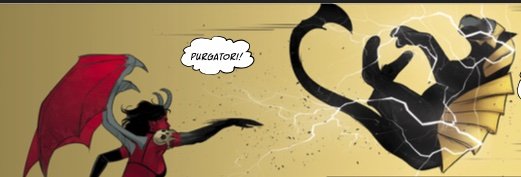Purgatori Must Die! #5 // Review
She’s addressing the reader on the opening splash page. She’s a beautiful nude diaphanous woman with devil wings somewhere just outside the reach of the Earth’s gravity. She’s confessing to the reader that she really WAS a danger from the beginning. “Eventually, I was gonna end up a threat to all the gods and make the universe my bitch or whatever.” It’s a candid moment that opens the fifth issue of Purgatori Must Die! Writer Ray Fawkes wraps up his series with a surprisingly interesting battle that comes to the page under the power of artist Álvaro Sarraseca. Color comes to the cosmic by virtue of the work of Salvatore Aiala.
Purgatori faces the combined might of quite a few impressive beings of great power: Athena, Hel, Lilith, Thoth, Nyx, and a few others. Purgatori has access to the minds of billions. Ten million wizards and ten million scientists are yelling at her from within her skull as fifteen million soldiers give her strength, cunning, and tactics. She’s the combined might of so many mortals. Who could stand a chance against her? If she’s going to make it out of one of the most powerful battles in the history of the universe, she’s going to have to give up a lot.
All too often, major cosmic battles are ineptly mishandled on the pages of comics. It can be really, really difficult to find the right way to express the kind of massive energies that the gods are dealing with in a way that seems suitably cosmic. Fawkes does a splendidly poetic job with some of the narration in the final issue of this series. It’s a cleverly thought-out solution to a problem that Fawkes set up in the first issue of the series. In the end, Purgatori has learned a bit, and she’s progressed as an intelligence. It’s a nice progression from the first to the fifth issues.
Sarraseca once again does a solidly respectable job with the drama. The personality of the characters feel fully realized as they emote very organically on the page. The problem is that the physical end of the action feels a little flat. A powerful cosmic battle should feature dramatic angles and powerful postures...strikes exploding off the page. Much of what Sarraseca is bringing to the page falls flat. Aiala does a brilliant job with the colors, though. There’s a gorgeous sense of depth to the cosmic. The action might be a bit weak, but it’s taking place in a world that feels fully immersive.
Cosmic-level conflicts happen quite often on the comics page. It’s rare, however, to have a cosmic-level battle end in a way that feels like it’s genuinely made one of the main characters grow as a person. Editorial tends to want readers to focus on Earth-shaking events that will change the universe forever...when we all know the status quo must be maintained. It’s much more satisfying to see a character like Purgatori actually becoming a slightly more sophisticated person at the end of the series.
Grade: B










